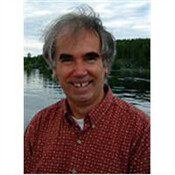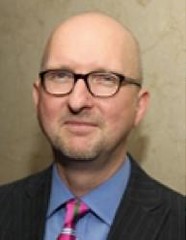[Section Voices: World Congresses of Music Therapy]
10th World Congress of Music Therapy: Interview with Nigel Hartley, Leslie Bunt, Gary Ansdell and Denize Christophers
By Barbara L. Wheeler
Memories from Nigel Hartley, Chair of the 10th World Congress of Music Therapy
How did it come about that the World Congress was held in the UK? And in Oxford?
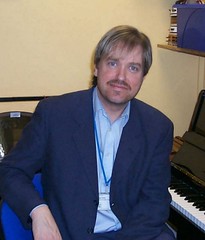
Nigel Hartley currently holds the post of Director of Supportive Care, a Senior Management position at St. Christopher’s Hospice, London. He has worked in end-of life care for over twenty years more recently working on the redevelopment of Day and Outpatient Services at St. Christopher’s Hospice before taking on his current position. He has held long-term posts at both London Lighthouse, a Centre for those living with HIV/AIDS, and also Sir Michael Sobell House, which is a large Hospice in Oxford. He is an experienced manager, counsellor, musician, and music therapist.
He is the only person to have simultaneously chaired both the Association of Professional Music Therapists (UK) and the British Society of Music Therapy.
Nigel has a postgraduate qualification in management from Ashridge Business School, England. Nigel’s main interests and passions are based around how we listen in our lives, and the language that we use to articulate our relationship experiences. Nigel has a National and International reputation as a teacher in end-of-life care, particularly the development of day and outpatient services, volunteers and health promotion. Nigel regularly publishes about his work. He is co-editor of the book ‘The Creative Arts in Palliative Care’ published by Jessica Kingsley Publications 2008. A new book ‘End of Life Care’ – a guide for therapists and artists is currently in production also with JKP. E-mail address: N.Hartley@stchristophers.org.uk
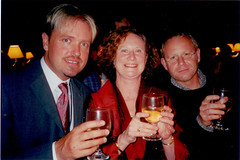
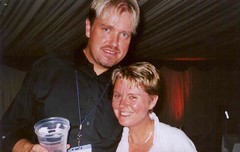
In the second half of the nineteen nighties, I was chair of the British Society for Music Therapy (BSMT). We were doing a lot of work during those years looking at the two music therapy organisations in the U.K. working more closely together. The BSMT had been up and running for over 40 years and had a remit to promote and disseminate information about music therapy across the country and members who were both music therapists and non-music therapists. The other organisation – the Association of Professional Music Therapists (APMT) was wet up in 1976 and was the professional body for music therapists across the U.K. and represented music therapists at political and policy level. All members of the APMT were music therapists or trainee music therapists. Although the two organisations had of course worked together over a number of years, there was a growing interest of looking at how the two organisations might merge together for the benefit of all music therapists and also those who showed an interest in the work. Also, with the development of State Registration for all Arts Therapists in the U.K. in the mid-nineties, the APMT was needing to re-examine its remit and change somewhat. One of the first important things we did was to initiate a joint membership of both organisations for music therapists. We also put a lot of effort developing a joint annual conference during these years, and we did this with some success. The annual conference was becoming a place where people could share work and come together to touch base and learn about new developments and interests. It was also important that people came together at these conferences confidently with their differences, where we could all begin to acknowledge and accept different ways of working and practicing with growing interest and increasing respect.
The BSMT committee, together with the committee of the APMT, decided that then was a good time to put ourselves onto the world stage, and at the 9th World Congress in Washington in 1999, I presented our bid to the World Federation and we were successful. The U.K. had hosted the European Congress in 1992 in Cambridge, so it was a step on from there really. I was living and working in Oxford at the time, and as I was to be the Organising Chairperson, it seemed ideal that we should focus our bid around Oxford. It was clear to us from the start that if we were to host the congress in Oxford, we would want to play on the uniqueness of the city and its history, particularly the University and its place in developing the culture and systems of democratic thought and practice. We wanted it to be a very British affair!
Who besides you was involved in the organization and who had what role? Was it completely organized by the British Society for Music Therapy (BSMT) and the Association for Professional Music Therapists (APMT)?
It was important that key people involved in the organisation of the Congress included those involved in current practice, research, training and education; people like Alison Levinge, Helen Odell-Miller, Kay Sobey, Sarah Hoskyns, Mary Simmons, Julie Sutton, Emma Bishton and Pauline Etkin. You always miss people out when remembering these things, but each person on the organising committee was crucial in terms of the culture and atmosphere that we needed to create for this particular Congress. Leslie Bunt and Gary Ansdell agreed to chair the Scientific Committee, and they put together a broad range of people from across the U.K. and the rest of the world to support them in achieving what was to become an exciting scientific programme. We also agreed early on that those of us organising it would pay for our congress attendance the same as everyone else, and that we would take on active role in the hospitality of the congress. For example, we all greeted delegates at the opening ceremony at the Sheldonian Theatre – showing them to their seats and making sure they were comfortable and cared for. This continued through all of the plenary and social events. It was very important to create a culture of welcome and warmth, and those of us organising the event were to be key players in this.
It is always easy when involved in organising such an event that we tend to look backwards – to those who have been around in the business for a long time and base the content on history rather than current practice and future vision. I have been to many different events over the years, where they can easily be foremost a platform for congratulating the organisers for what they have managed to achieve over their careers. We wanted this Congress to be about the delegates – those who came along to present a paper or provide, more importantly, a listening ear. We didn’t want to ignore the past, but we wanted a real focus on the present and a look into the future. Of course, all of this would be held within an extraordinary city steeped in U.K. and world history.
I can’t go any further, of course, without mentioning the key person who was behind the success of the 10th World Congress in Oxford – Denise Christophers. Denise had been involved with the BSMT since the early days, and had administered the society for around 30 years at the time of the Oxford Congress in 2012. She was, and is!, an extraordinary force, and I learned so much from her about organisation, attention to detail, and how to make something on the scale of the world congress really work. She worked stalwartly over the three years building up to the Congress, and if there is one person who deserves to be mentioned for their part in it and the congress success, it has to be her. Gary Ansdell was also very supportive and worked hard with Leslie Bunt to make the scientific programme work and was a great personal support to me.
How was the planning of the congress organized? How did you become Chair of the congress?
As mentioned, I became chair of the congress because I was chairing, at that point the BSMT. The organising committee met regularly. As time went on, our meetings were held in Oxford and I remember some fun times coming together to arrange events and choose venues across the City. At the time of the world Congress, I also became chairperson of the APMT – the first person ever to jointly chair both of the U.K. music therapy organisations. Again, the aim of this was to look at the possibility of the two organisations working more closely together and possibly becoming one body. Diana Asbridge was the administrator of the APMT, and she was also very helpful during the organisation of the congress working alongside Denise and the others. It is interesting to note at that stage, how difficult the thought of having a joint chairs of both the organisations was for some people, and I was lobbied by a group of people not to chair both of the organisations. I remember first voicing the idea of a new body called The British Association of Music Therapists at the national conference at this time and although there was a lot of support, some people shot it down in flames. It’s fascinating to point out that today – ten years later, that the merger has been undertaken and we have a great new organisation called, wait for it – The British Association of Music Therapists! I guess some things just take time.
How was the congress organized? Were there plenary sessions and also smaller sessions? What translation did you have and how was it handled?
We decided – I think it was an original idea from Gary Ansdell – to focus on the "dialogue and debate" theory of the Oxford University Debating Society – where people would come together to present different views in a supported environment. Once we had this idea, the programme started to evolve. There were to be three main strands. The first Music, Culture, Social Action, highlighted the music therapy tradition within the wider world of community. The second Music, Meaning, Relationship revisited and established the world of psychoanalysis as a possible forum for which music therapists might choose to place their work. The third, Music, Spirituality, Healing examined music therapy from within the context of spiritual tradition. Three key note speakers from outside of the music therapy world headed up each strand – Professor Nigel Osborne, Dr Anne Alvarez, and The Very Reverend Michael Mayne respectively. Each day focussed on one of the key strands and a keynote was given by each of the main three speakers above. Music therapists were then invited to respond to their keynote lectures from different perspectives, together with questions from the audience – in true "dialogue and debate" style. We then had a series of papers from those who had put in abstracts to present. We were fortunate enough to have the use of a number of amazing venues such as the Sheldonian Theatre, The Oxford Town Hall, The University Examination Schools, Keble College, St Catherine’s College and St Edward’s (Teddy’s). On the fourth day, we held three "keynote forums", where everyone could come together to delve a little further into the three main themes. Mercedes Pavlicevic chaired one on Community Music Therapy, Alison Levinge chaired one on "Levels of Meaning: Relationships in Music Therapy" and I chaired the third on Spirituality in Music Therapy.
I think the Oxford Congress will partly be remembered for "Translationgate"! We had planned to translate the major parts of the Congress into Spanish simultaneously. However, our thoughts about this changed as the Congress approached. It was nine months after 9/11 and we were concerned that many people would be afraid to travel across the world. My memory was that there had been a downturn in the air industry and prices for flights had started to rise to an all-time high. We wanted as much as possible to keep the cost down for those people coming to the congress and this was very important to us. Translation into Spanish was extremely expensive, and as the Congress approached, we realised that the number of people booked in who were requesting translation into Spanish was very low indeed and the cost of translation was going to become prohibitive. We therefor made the decision to hold the entire congress in English, so that the cost could be kept as low as possible. For the few people who did require translation, we offered the possibility for them to sit together with someone who could translate for them. I still think of this as one of the things we didn’t get quite right, and if we were doing it again, we would have decided up front not to translate from the beginning. Interestingly, it was one of the suggestions from someone who had been involved in the organisation of the Washington Congress in 1999. This person advised us to run the Congress in English, as the cost of translation could easily become prohibitive. I know it was a disappointment to some that we chose not to translate into Spanish, and I apologise to them. But, when you organise something like this, difficult decisions have to be made, and this was one of them for me.
Overriding this, however, I think we did manage to get an overall sense of welcome and inclusiveness at the Congress. Both Denise Grocke, who was the president of the World Federation of Music Therapy (WFMT), which I also sat on the committee, and myself said clearly at the opening ceremony that we wanted delegates to step out of their comfort zones during those days. What we meant by this, was that people should attend presentations that were showcasing ways of working that were totally different from themselves, in order to both broaden understanding and effect practice. We wanted the Oxford Congress to make a difference.
What social activities were planned? How many people attended and from how many countries?
We had great fun planning the social programme. There was lots of live music – at meal times and breaks, for example. We wanted to showcase great music and we had concerts from Evelyn Glennie and also from Julian Lloyd Weber as part of the opening and closing ceremonies. There was a wonderful spoof "Oxford Union debate" chaired by Leslie Bunt – "Phoenix or Dodo? – will music therapy survive the 21st Century?" There was a very uplifting service of Evensong from Keble College Chapel, where the memory of hundreds of music therapists singing glorious English hymns together still sends a shiver down my spine!
Around 1000 people attended. I am unsure from how many countries, but I am sure Denise will be able to answer this! We arranged for a large Marquis with a bar to be based at Keble College in the quadrangle. This became to focal point for much socialising – a lot of jollity and fun as well as continuing to dialogue and debate around the congress key themes late into the night. The weather was kind to us, and the sun shone on Oxford during that week. As the Congress took place in the colleges based right within the City, many people were also able to benefit from this – punting on the river and eating afternoon tea in some of the stunning college gardens as well as taking in some of the ingoing events in the city such as outdoor performances of Shakespeare.
We were adamant that the Congress should be an ‘all inclusive’ affair and one which was as balanced and equal as possible! As I mentioned earlier, everyone on both committees paid the Congress fee to attend – there were no free places! One overall cost would include accommodation, food and entrance to the Congress scientific and social programme. People were to have an experience of what it was really like to be a student in one of the Oxford Colleges. Mealtimes resembled scenes from Harry Potter, and people were able to wonder the streets where the famous Inspector Morse mysteries had unfolded.
What were some of the highlights for you - in terms of the formal congress content and personally?
It’s extraordinary to think that its ten years ago! I loved organising the Congress, it is one of the lasting memories I have in my life! Difficult to choose favourite bits – but I have to say that Evensong in Keble College Chapel was something that has stayed with me. The other experience that I remember was the response from the audience to the keynote speech given by Michael Mayne in the Oxford Town Hall on the final day. Something really important happened that day for those of us that were present at that final keynote speech – the response from the floor was a standing ovation and tumultuous applause; it was as if we all had a profound realisation of something being articulated about the work which had possibly never happened before, and realising this together. Michael died some years ago. I know that the response to his keynote speech at the Congress was an affirming and life changing experience for him also.
I also have an overriding memory of the day before the Congress started of myself, Gary Ansdell and Denise Christophers filling up 1000 Congress bags so they would be ready for delegates when they arrived to register the following day! We cut costs wherever we could, which gave a real sense of camaraderie and fun for those of us closely involved in the organisation. It also helped to keep our philosophy central at all times - that we were all in it together – organisers, presenters and attendees – all for one and one for all! It helped towards creating a great atmosphere and instilling a true sense of community and belonging which was a major aim for us.
The Congress for me was the culmination of my career as a music therapist. The following year I left music therapy and became a senior manager at St Christopher’s Hospice in London. A couple of days ago, I made a rare return to Oxford to attend a meeting. As I travelled, it was interesting that my first memories were of the Congress, although I had lived and worked there for over eight years at Sir Michael Sobell House Hospice! I hope those who came to Oxford in July 2002 remember the congress with fondness and that hopefully we were able to make some small difference to the worldwide music therapy community and its future development.
See also some of the pages from the conference program 10th World Conference of Music Therapy 2002 (pdf)
Some memories from Leslie Bunt, Chair of the International Scientific Committee
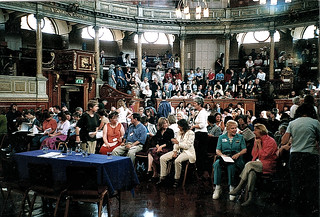

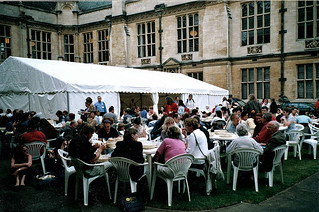
What would be an appropriate theme for this 10th music therapy world congress and the first of a new century? This was the main topic of discussion when Gary Ansdell and I met for tea to think about a proposal for an overall theme for the congress and to begin inviting people to join us on the international scientific committee. We were fortunate to be able to base the conference at the University of Oxford, one of the world’s oldest and most prestigious places of learning. Gary came up with a theme of Dialogue and Debate which resonated well with our academic location. And then there was the need to acknowledge the move into a new century so we added the sub-theme: Music therapy in the 21st Century - a contemporary force for change.
During this initial meeting Gary and I began to explore central areas that would reflect the position of music therapy internationally in 2002.(In the rest of these memories I borrow extensively from my introduction to the book of proceedings (110 articles are included) edited by Jörg Fachner and David Aldridge.) We wanted to acknowledge where music therapy had already made an impact and also to embrace areas of development and change. The roots that music therapy has in broad musical, cultural and community-based contexts throughout the world were reflected in the eventual choice of the first area: Music, Culture, Social Action. The second area moved the spotlight to exploring frames of meaning within therapeutic relationships: Music, Meaning, Relationship. In many ways the third area Music, Spirituality, Healing was the most controversial but as organisers we were very keen to give space to this emerging theme within international music therapy.
At other world congresses, in addition to listening to leading international figures in music therapy a different kind of inspiration came from presentations given by people from outside music therapy. For example I recalled listening to the distinguished psychologist and psychiatrist Karl Pibram present in 1993 in Vitoria, Spain about music and the brain. We decided to build on this for the Oxford congress by inviting keynote presenters whose primary discipline was not music therapy but who had much to say to an international gathering of music therapists. In keeping with the theme of Dialogue and Debate we then invited music therapists with specific experience within the chosen areas to respond to the keynotes, making connections to the world of music therapy. The morning’s facilitator would then open out the dialogue and debate further by inviting questions and comments from the audience. In this way each of the three main days would start with an invited keynote and responses. We would then maintain the area as the over-arching stream of the day into which the many papers, presentations and workshops could be organised.
After the opening ceremony convened by the Conference Chair Nigel Hartley and concert given by Evelyn Glennie, it was a great privilege at the start of the next first full day to open the proceedings in the Sheldonian Theatre and to introduce the first keynote presenter within the area: Music, Culture, Social Action. Professor Nigel Osborne was an immediate choice to be invited to give this first opening keynote. It is quite fortuitous that the last issue of Voices included an interview that Alpha Woodward had with Nigel Osborne. When writing the introduction to Alpha’s interview I was reminded once again of the three powerful challenges that Nigel presented at the end of his address to the audience of over 800 that morning nearly ten years ago in Oxford, challenges about our work from practical, intellectual and moral perspectives that still have resonances today.
In her keynote which opened the area Music, Meaning, Relationship the well-known child psychotherapist Dr. Anne Alvarez explored some of the different levels of meaning in psychoanalytical work and made connections with music and therapy. She opened up areas of debate around both the non-verbal and pre-verbal nature of much that is at the root of the communications within a music therapy encounter.
For me personally one of the most moving memories of the conference was the spontaneous standing ovation that greeted the end of our third guest’s keynote. The late Very Reverend Michael Mayne’s opening address to the third area of Music, Spirituality, Healing appeared to touch the many people gathered that morning from different philosophical traditions and backgrounds, systems of belief and experiences. I cherish the memory of one of Michael Mayne’s concluding remarks as he reminded us to consider a person as "not a problem to be solved but as a mystery to be loved." For those who are not familiar with his writings they are imbued with a deep love and knowledge of music and the arts, not least in his most honest account of his final journey with cancer that sadly was to occur soon after his presentation in Oxford (Mayne, M. (2006). The Enduring Melody London: Darton, Longman & Todd).
Nigel Hartley has commented in his interview on many aspects of the organisation of the congress. One further memory is the rather incongruous sight of a room in the ancient confines of the Examinations Schools of Oxford University dedicated to the latest technological support necessary for the smooth running of the presentations, enlivened not only with audio and video but also with Powerpoint and other advances in computer technology. I recall that regular correspondence via email was still quite a new development at this time. These technological advancements made facilitation of the work of the international scientific committee all the more flexible. We benefited initially by the report presented by Kenneth Aigen, the chair of the international scientific committee of the previous congress held in Washington. We invited members of the Oxford scientific committee to co-ordinate selection of the various themes within the three over-arching areas, working together in small specialist groups using a ranking system in order to make their final recommendations. Overall delegates from over 40 countries attended the Oxford congress; 250 papers and 42 workshops being included in the Book of Abstracts.
Quite early in the planning for the congress we had decided to host a debate on the final evening on the future of music therapy in the 21st century. The University of Oxford is famous for its debates and Debating Society; we wanted to honour this tradition. Quite up to the last minute we were approaching various well-known television presenters to act as chair of a serious debate with two teams of music therapists representing the different sides of the argument. But as people who attended will recall, the event ended up as far from the highly serious original intent as we allowed ourselves to have fun and play with the whole notion and form of a debate. I was invited to chair and to try and maintain some semblance of order, given that we were in this land of the so-called "mother of parliaments." The teams were led by Denise Grocke and Gary Ansdell and I shall always remember the gradual acknowledgement amongst the packed audience in one of the large halls in the Examinations Schools that this was a good old piece of satire as each speaker very skilfully introduced more and more outlandish ideas into their speeches. We only had use of the hall for an hour which meant I had to intervene quickly at the end and not allow any final audience discussion or vote, deciding, as we exited to the collective tumult, that the final result was that there was no chance that music therapy would survive the century. I was pleased to overturn the decision during the next morning’s closing ceremony and reflect that, given the high quality of the presentations during the congress, music therapy would very much survive, well at least for half of the century! This was a side of my involvement at the congress that I had not expected. As musicians we are used to performing but I had never enjoyed something that comedians must experience whenever they perform, namely the different kinds and levels of audience laughter and the dropping into an extended collective silence a punch-line to cap what had previously gone before. Such fun!
Nigel Hartley has mentioned the lovely weather, the music, conversations late into the night in the marquee and various bars and cafés during our time in Oxford. Being involved in the organisation meant that it was not possible to attend too many presentations but from comments during and since I hope we were able to play our part in answering a theme of the congress that music therapy is in many ways "a contemporary force for change" and very much here to stay.
Memories from Gary Ansdell, Deputy Chair of the Scientific Committee
I wanted to add a postscript to Nigel and Leslie's fascinating accounts of the Oxford Congress. They both reminded me how stimulating, beautiful, funny and sometimes overwhelming those Oxford days were! I too can remember most hours (and sometimes minutes) of that week, especially a few of the more dramatic or traumatic ones (the stories of which are sadly unprintable until the requisite thirty years have passed and the archives opened!).
I'd like to take a few moments to think about the legacy of that conference. Because each one of these world events has been so significant for both the people involved, but also for the progress of the discipline and profession, I think it's right to think of legacy - rather in the way that the Olympics typically do (and my thought runs this way as the Games this year are only some miles from where I'm writing this!).
Oxford's legacy relates I think to some key aspects of music therapy developing at that time that the conference set out explicitly to champion and further. Nigel is fair and magnanimous in sharing praise for Oxford's successes in his account. But the truth is that the main spark of courage and commitment always came from him. He was willing to put his neck on the block and unapologetically promote two aspects of music therapy that at that time ten years ago had been either marginalised or undeveloped in the international discipline and profession: community and spirituality. With boldness and confidence (and just a little provocation) Nigel made sure that these aspects were both strongly represented. This allowed a new level of intelligent dialogue and debate that led subsequently to a significantly increased awareness and legitimation of the role of spirituality and community in music therapy practice, theory and research. This is perhaps the key legacy of Oxford.
Many people have mentioned the power of Michael Mayne's talk. It was indeed a fine one, but the uniqueness of this event was how it somehow called from a great man of the spirit what the audience wanted and needed to hear. A woman in the row in front of me was in tears at the end of the session. She said that she'd waited years to have the spiritual dimension of music therapy acknowledged and legitimated publicly in such a powerful way.
Similar was the emerging recognition at that moment that the social and communal potential of music therapy needed far greater acknowledgement and legitimation than had been the case in the international consensus of the previous twenty years. Brynjulf Stige has recently published a fine book, Invitation to Community Music Therapy (Stige & Aaro, 2012, Routledge) in which he makes some interesting comments about the emerging discourse and practice of Community Music Therapy in relation to the Oxford Congress. Stige talks of 2002 as a turning point in international awareness of music therapy and community, and that "In the 10th World Congress in Music Therapy in Oxford the same year, community music therapy was a central topic of discussion" (p.46). This linked with another interesting factor that was impacting on the communication and development of international music therapy: the growing power of the internet. Voices had only been established in 2001 and was being read across the globe in a new way for music therapy during 2002. I sneakily published my somewhat provocative article "Community Music Therapy and the Winds of Change" on Voices just months before the Oxford Congress. As Brynjulf comments "this could be read across countries and cultures. The scene was set for international dialogue and debate."
But of course the real work of an international conference such as Oxford comes mostly from the power of face-to-face encounters, albeit that the new technological means had enabled a particular kind of preparation for the dialogue and debate.
The legacy of Oxford then is perhaps in keeping the tradition of this place and its radical and creative thinking. It allowed community and spirituality to sound again - confidently and joyously - in the multi-voiced heterophony that is music therapy.
Memories from Denize Christophers, BSMT Administrator 1972-2005
Denize undertook her secretarial training at British Petroleum after leaving school and as one of their trainees had a good job in Personnel Dept, Travel Branch. She left when her first daughter was born and was a full-time mum for several years. When her two children were at school she had several part time secretarial jobs, but found working with Juliette Alvin the interesting and challenging work she was looking for. Two more children followed and Denize finally worked for the BSMT for a total of 33years. She is now retired but has become Hon Treasurer for the Enfield Branch of Parkinson's UK, where she also edits their Newsletter and organises most of their activities and outings. Her family are very close by and she has very frequent visits from her eight grandchildren, with number nine expected early in June. She says that she hasn't the energy of the past, but feels she is doing ok especially as she will be 70 next year, and celebrating 50 years of marriage the following year - parties already in mind!
I well remember when Tony Wigram asked me whether I thought the BSMT and our administration team could take on the organisation of the World Congress in 2002. Nigel Hartley had just become Chair of the Society so I looked across at him, we quickly chatted, made our decision and that was that! This was the start of the big adventure. 800 people in Oxford for 5 days, quite a challenge.
I visited the Colleges, the Examination School, the Town Hall, and the Sheldonian Theatre -all our venues had to be visited and re-visited many times during the planning years. Sometimes on my own, just with Nigel or the whole Committee.
It was an enormous amount of work but I am bit of a workaholic so it wasn't too much of a hardship. But I know that time has made me forget the tiredness, the difficulties and I rather remember now the pleasures and fun. The sight of the huge marquee in Keble College with huge flower display in the middle, the sight of everyone sitting down for dinner in College- long, long tables all laid for dinner, the busy people in the Exhibition Hall where we sold books and musical instruments. The Opening and Closing ceremonies which we had decided would be the best ever and they were! Evelyn Glennie and Julian Lloyd-Webber were big stars and did us proud.
Some memories can make me laugh out loud - the expressions on the faces of the Organising Committee when I told them they were required to fill 800 delegates bags with Congress Programme, Book of Abstracts, map, notebook and pen etc. It was a huge job which had to be done in one day, but we did it, although to my horror we forgot to put in a CD! That caused a bit of trouble.
We had an enormous amount of "stuff" that had to be transported to Oxford - over 800 copies of the programme, book of abstracts and everything else I mentioned above that had to go in the delegates bags, as well as the books I would be putting on show and selling and some technical equipment and paints. I hired a "man with a van" for the transportation but he had to make two journeys to get the lot there! It was a huge task.
The admin team all wore the same "uniform" of cyan blue jacket and skirt, or navy trousers with blue shoes and white tops. These t-shirt tops were wonderful quality and I had 2of them and I still wear them for bowling! Ten years on and they still look good as new! Wearing this gear was good as we could be seen easily and therefore could be of help if needed, which we were on many occasions. My worst moment was having to send someone off the campus as he was trying to get a free dinner - having been told by me that his day ticket did not include dinner in Keble College. He came back next day for the papers but didn't try it on in Keble Dining room again - anyway as far as I knew.
I have a wonderful A1 size collage of photos and memorabilia of the event -maps showing the areas of Oxford we used, the three colleges, Town Hall, Examination School and Sheldonian Theatre, hanging on the wall of my office at home. There are also copies of the drawings I made for the Covers of the Programme and Book of abstracts, and the Phoenix and dodo drawings I did. Photos are mainly of the social side of the congress and the therapists I was most involved with - all of which fill me with lovely memories each time I look at them.
The www.mt2002 website [link via the waybackmachine] was just the second I had designed and one of the fun things I liked was the logo that Nigel and I had agreed on -the sun and sunbeams - if you clicked on this it took you to the top of the page -such fun at that time, but websites are much more sophisticated nowadays, but this was about twelve years ago.
I made many visits to Oxford, sometimes alone and sometimes with other committee members, sometimes just one or two of them. I even got fed up with the motorway journey and found a country route which was a little longer but so much nicer. On one visit with all 12or so of us, we called in at the Examination School to look around and I met the caterer we had booked for our event. He was putting on a display of his wares for clients and this resulted in all of us having a quite delicious lunch, free of charge and totally unexpected. He did ok out of it though as his company provided 800 lunches for us each day of the congress.
I am proud of the work I did for the Congress. We had some experience in congress/conference planning as we had organised a large event in Cambridge in 1993 I think it was, and I had attended several overseas congresses too, as had all the other organising committee members, so we were a pretty experienced team. My staff from the office - Louise and Lisa were joined by Mike (my husband) and Dianne (APMT Administrator) to provide the help we needed in the congress office. One morning a music therapist demanded of the staff use of the office phone. He was very cross when this was refused (in line with our agreed policy). He then raged he would report this unhelpful person to me, which he did. I calmed him down and then took him back into the office and introduced him to my daughter Louise! His face was a picture, we all had a good laugh and all was well. But our costs were high enough without overseas phone calls added to our bill.
I could go on and on, it was a very special time for me. Nigel was a wonderfully supportive Chairman and we got on very well. I was very thrilled when he presented me with the lovely glass window art, designed and made especially for me by Vital Peeters. This was in recognition of my then 30 years service with the BSMT. (I went on to do 3more before retiring). The presentation was in the magnificent Sheldonian Theatre and as everyone clapped, shouted out and stamped their feet I was very touched - they had all booked their congress place with us, all submitted their presentations, all sent me their queries and I felt I knew them all, and now they were thanking me. It was a lovely moment!

